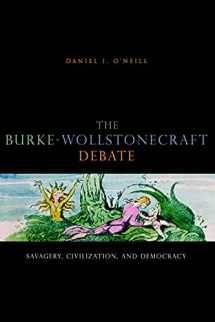
The Burke-Wollstonecraft Debate: Savagery, Civilization, and Democracy
ISBN-13:
9780271032016
ISBN-10:
0271032014
Edition:
1
Author:
Daniel I. ONeill
Publication date:
2007
Publisher:
Penn State University Press
Format:
Hardcover
296 pages
Category:
Authors
,
Arts & Literature
,
France
,
European History
,
Modern
,
Philosophy
,
Political
,
Feminist Theory
,
Women's Studies
FREE US shipping
Book details
ISBN-13:
9780271032016
ISBN-10:
0271032014
Edition:
1
Author:
Daniel I. ONeill
Publication date:
2007
Publisher:
Penn State University Press
Format:
Hardcover
296 pages
Category:
Authors
,
Arts & Literature
,
France
,
European History
,
Modern
,
Philosophy
,
Political
,
Feminist Theory
,
Women's Studies
Summary
The Burke-Wollstonecraft Debate: Savagery, Civilization, and Democracy (ISBN-13: 9780271032016 and ISBN-10: 0271032014), written by authors
Daniel I. ONeill, was published by Penn State University Press in 2007.
With an overall rating of 4.2 stars, it's a notable title among other
Authors
(Arts & Literature, France, European History, Modern, Philosophy, Political, Feminist Theory, Women's Studies) books. You can easily purchase or rent The Burke-Wollstonecraft Debate: Savagery, Civilization, and Democracy (Hardcover) from BooksRun,
along with many other new and used
Authors
books
and textbooks.
And, if you're looking to sell your copy, our current buyback offer is $0.3.
Description
Many modern conservatives and feminists trace the roots of their ideologies, respectively, to Edmund Burke (1729–1797) and Mary Wollstonecraft (1759–1797), and a proper understanding of these two thinkers is therefore important as a framework for political debates today.According to Daniel O’Neill, Burke is misconstrued if viewed as mainly providing a warning about the dangers of attempting to turn utopian visions into political reality, while Wollstonecraft is far more than just a proponent of extending the public sphere rights of man to include women. Rather, at the heart of their differences lies a dispute over democracy as a force tending toward savagery (Burke) or toward civilization (Wollstonecraft). Their debate over the meaning of the French Revolution is the place where these differences are elucidated, but the real key to understanding what this debate is about is its relation to the intellectual tradition of the Scottish Enlightenment, whose language of politics provided the discursive framework within and against which Burke and Wollstonecraft developed their own unique ideas about what was involved in the civilizing process.


We would LOVE it if you could help us and other readers by reviewing the book
Book review

Congratulations! We have received your book review.
{user}
{createdAt}
by {truncated_author}


